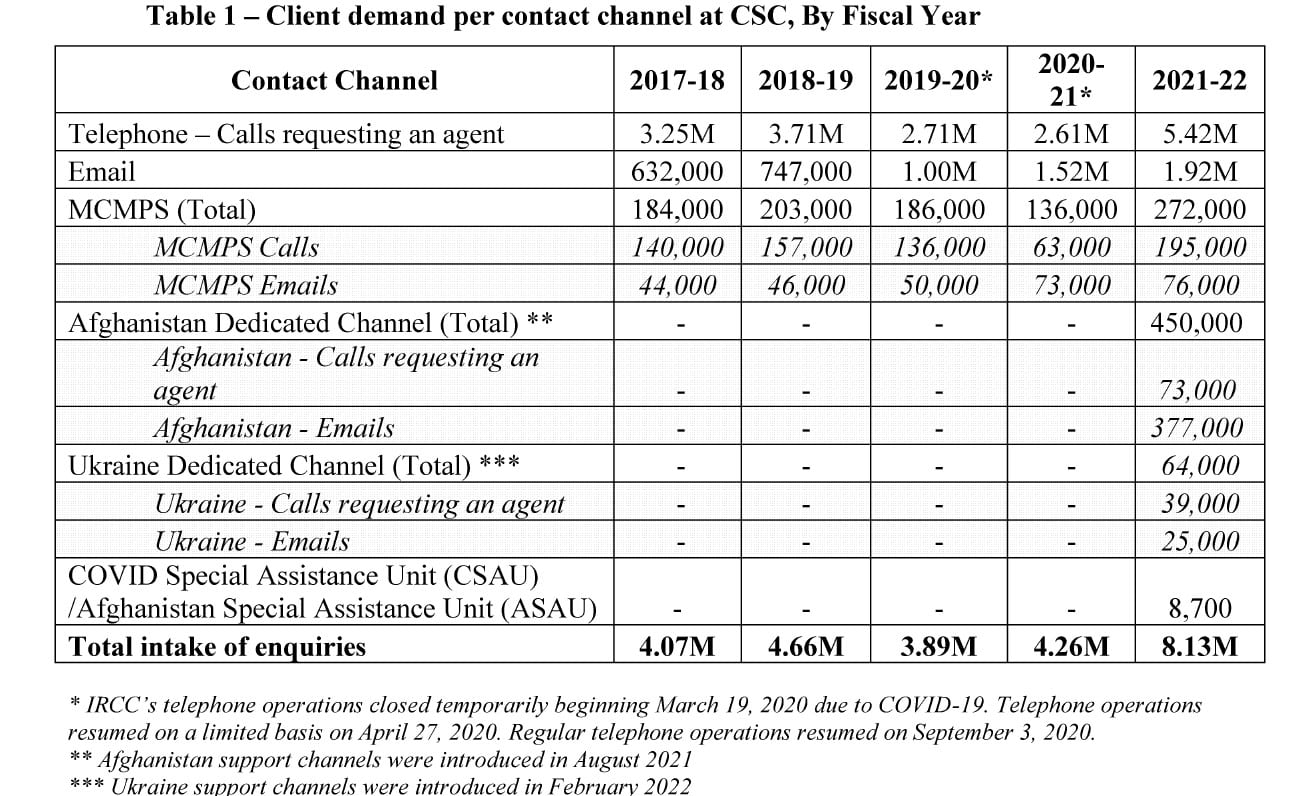IRCC struggling to keep up as enquiries have more than doubled over the past five years
Immigration Refugees and Citizenship Canada (IRCC) received more than eight million enquiries through its Client Services Centre (CSC) in the 2021/2022 fiscal year. This is more than double the 4.07 million enquiries in 2017/ 2018.
The information was made available as part of an update to a report by the Office of the Auditor General (OAG) that was originally conducted in 2019. CIC News obtained an internal IRCC briefing containing the information through an Access to Information Request (ATIP).
Further, another report released by the Treasury Board of Canada Secretariat found that IRCC is not keeping pace with the number of ATIP requests it receives. The last time IRCC closed more ATIP requests than it received was in the 2012/2013 fiscal year.
Discover if You Are Eligible for Canadian Immigration
The OAG report update showed that the original report in 2019 made recommendations to IRCC, Employment and Social Development Canada (ESDC) and Veterans Affairs on how to improve client service. Two recommendations were mentioned.
The first stated the ESDC and IRCC should review how incoming calls were managed to improve access to agents and that both agencies should consider allowing callers to decide if they prefer to wait, use self-service options, or have the call centre call them back.
The second recommendation stated the ESDC, IRCC and Veterans Affairs should:
- Establish call centre service standards that are relevant to clients and consider client feedback as per the Treasury Board of Canada Secretariat Guideline on Service Standards; and
- Publish call centre service standards and performance results in a transparent and consistent manner and verify the results to confirm accuracy.
Changes to client services since 2019
Not long after the initial audit, the COVID-19 pandemic and other global crises created an increased demand for personalized support from the IRCC Client Support Centre (CSC). The updated report found that the number of calls that successfully reached an agent had declined since the original audit but also that the volume of incoming calls and inquiries across all channels had increased by 100% since 2017-2018.
The OAG report update found that despite the lower amount of answered calls and lengthier delays in email responses, IRCC had successfully followed the recommendations and implemented measures to improve client service.
For example, in 2017/2018 IRCC received 3.25 million calls requesting an agent and 5.42 million in 2021/2022. The number of emails more than tripled over the same period from 632,000 to 1.92 million.
In response to the increased demand due to political unrest, in 2021 IRCC introduced phone lines to offer dedicated support for those impacted by the crisis in Afghanistan, and another was introduced due to the Ukraine crisis in 2022.
These numbers significantly increased the total number of enquiries seen in 2021/2022 fiscal year. There were 450,000 enquiries to the Afghanistan dedicated channel, 377,000 of which were emails.
There were also 64,000 enquiries to the Ukraine dedicated channel the same fiscal year. As the fiscal year runs from April 1 to March 31, this means that all these enquiries were made over just two months, from February until the end of March 2022.

CSC support for MPs and Senators
In addition to general enquires from applicants, IRCC offers dedicated support to Members of Parliament and Senators via telephone and email through the Ministerial Centre for Members of Parliament and Senators (MCMPS) which accounted for 272,000 total enquiries in 2022.
An IRCC report released in November 2022 showed that the MCMPS was offering approximately 1,000 hours of support to MP/Senator offices weekly. The report said this support allows MPs, Senators and their staff to have more consistent, predictable, and reliable support from IRCC which helps them better serve their constituents.
Additionally, it said IRCC has been modernizing MCMPS services to include an online appointment-based system for MP and Senator offices. The online appointment system was implemented in October 2022 and at the time of the report offered 200 hours of available appointments per day.
Afghanistan and Ukraine dedicated crisis support
The November report showed that the CSC’s dedicated crisis support channels for Afghanistan and Ukraine between April and October 2022 had a high performance rate including:
- 172K telephone enquiries and 123K email enquiries; and that
- Its performance (or call answer rates) for both crisis lines was 66% (Afghanistan) and 77% (Ukraine).
The report forecasts that in 2022/2023, the CSC will receive 11.5 million enquiries with a call answer rate of more than 20%. It does not contain predictions for how long it will take to answer email enquiries but shows that the average response time for emails between April and October 2022 was 22.8 days, a dramatic drop from the 4-day response time in 2019/2020.
IRCC overwhelmed by Access to Information requests
The Access to Information and Privacy Statistical Report for 2021–2022 shows that IRCC received 79.7% of all access to information requests received in 2021/2022. IRCC also received a significant number of personal information requests in 2021/2022. This is a notable increase from the 2012/2013 data that showed IRCC received only 45.4% of requests.
Access to Information Requests carry a service standard of 30 days to disclose requested information to clients. In 2021/2022, over 109,000 of all ATIP requests were closed beyond legislated timelines. Of these, IRCC accounted for 89.1% and cited “Workload” as the main reason for closing requests past legislated timelines.
The report says IRCC has not been keeping pace with the number of requests received. For example, the number of ATIP requests submitted to IRCC spiked from more than 107,000 in 2020/2021 to 177,473 in 2021/2022 and IRCC carried over 49,392 requests to 2022/2023.
Ways IRCC is working to improve client service
The COVID-19 pandemic highlighted the advantages of modernizing and digitizing Canada’s immigration system. For example, to reduce the pressure on the CSC, IRCC introduced a new Permanent Residence Application Status Tracker for family class spousal, common law, and dependent clients in February 2022. It later did the same for Express Entry candidates. These trackers allow applicants to track their application status without contacting an IRCC representative.
The November report also says that IRCC has been using budget funding since 2019 to hire 237 full-time employees, many of whom were originally on two or three-year contracts and are now permanent. It also says that IRCC will use funding from Budget 2022 to hire an additional 107 incremental full-time employees.
Additionally, Budget 2022 promised funding of $136.5 million over five years, starting in 2022-23, and $37.2 million ongoing, to address higher demand for client support services.
- Do you need Canadian immigration assistance? Contact the Contact Cohen Immigration Law firm by completing our form
- Send us your feedback or your non-legal assistance questions by emailing us at media@canadavisa.com





